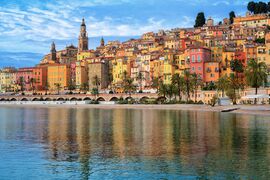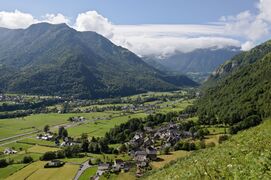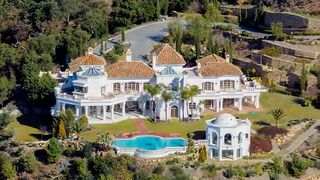Aciria
Grand Empire of Aciria Grand Empire d'Acirie | |
|---|---|
Motto: L'union fait la force Strength through unity | |
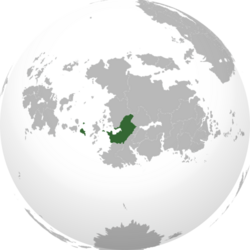 | |
| Capital and largest city | Trosseurs |
| Official languages | Acirien |
| Ethnic groups |
|
| Religion | Catholicism |
| Demonym(s) | Acirien |
| Government | Absolute Monarchy |
• Emperor of Aciria | Quentin Dupois |
| Legislature | Grand Assembly |
| Imperial Senate | |
| People's Senate | |
| Establishment | |
• Age of the Three Sisters | 300 BC - 220 BC |
• Age of the Schism | 220 BC - 50 AD |
• Age of Disorder | 50 AD - 1273 |
• Age of Stability | 1273 - 1615 |
• Age of Instability | 1615 - 1783 |
• Age of the Empire | 1783 - Present |
| Population | |
• Estimate | 76,875,000 |
• Census | 76,883,723 |
| GDP (nominal) | estimate |
• Total | $2.908 trillion |
• Per capita | $55.875 |
| Currency | Fleur (FLR) |
| Driving side | right |
| Internet TLD | .ai |
Aciria, officially the Grand Empire of Aciria, is an Absolute Monarchy on Sarpedon, bordering Pelaxia, Grajnidar and Volonia. Aciria is composed of 7 Administrative regions, 3 Special administrative regions, and multiple Imperial Dominions. Boasting a population of 76,883,723, a steady population growth is guaranteed by the controversial law that mandates every able-bodied woman to give birth to at least two children. The capital, the largest city and the home of the Imperial Court is Trosseurs, named after the Three Sisters cult of antiquity.
The history of Aciria is a series of tragic disorders with the local populations desperately clinging to any type of power that guarantees them stability in the region. Starting in the Age of the Schism, the heartlands of modern day Aciria were plagued by local conflicts over faith and warring warlords, finally culminating in the declaration of independence in 1615, followed by nearly 200 years of political instability, and near constant state of civil war between different factions vying for power. This era finally ended in 1783 when the Marshal of Aciria Jean Dupois murdered the ruling king and throned himself the Grand Emperor, ushering in an era of unprecedented peace in the region. The descendants of Dupois have ruled Aciria with an iron fist since then, a price the population is willing to pay due to fears of the region falling into instability once again otherwise.
History
Due to limited literacy in the region, much of the early history of Aciria was lost to time, mostly written based on oral tradition and comparing it to archeological dig sites.
Age of the Three Sisters
300 BC to 220 BC is known as Age of the Three Sisters in Aciria. Oral traditions and limited writing from the region told of a local ruler who desperately tried to gain a son to take his throne after he passes, but managed to only bring three daughters to this world; Safo, Canyae, and Nayo. After his passing, the three sisters together took the throne and ruled not as only political leaders, but due to their unparalleled charisma, locals began to see them as envoys of the Gods. The sisters played along, using this as a chance to further expand their power in their petty kingdom. The era is remembered for both its peace, prosperity, and the founding of their capital, Trosseurs (originally Trois Sœurs, lit. Three Sisters) and is a part of the reason why the Three Sisters have been held in high regard in Aciria, even long after their conversion to Catholicism.
Age of the Schism
Once the last sister passed away at the age of 87 in 230 BC, their appointed King Edes ruled for a decade with relative peace. With the Three Sisters still in close memory, people heeded their word as Edes as the next envoy of the Gods as the truth. In 220 BC, a noble named Iodes who served under Edes spoke to his fellow nobles about the irresponsible spending of money on himself instead of the people like his predecessors had, calling him a false envoy. Many nobles agreed with him, and despite Iodes' pleas, many nobles and commoners began calling him the true envoy, calling Edes an impostor. This started the first schism which only deepened as time went on, further, smaller cults claiming their leader to be the true envoy sprouting up. Despite the fact Edes managed to avoid civil war, the schisms caused small-scale conflict in the region between nobles and commoners alike, and the King's power was diminished greatly.
Age of Disorder
The period of political instability started by the First Schism in 220 BC eventually lead to the collapse of the local governments, returning the area to glorified tribal societies warring and raiding against each other. This era is particularly known for its lack of written records, causing historians to suspect a further drop, or perhaps a total loss of literacy in the area. The multitude of archeological digsites in the country have proven that multiple genocides took part in areas of the country, proven by multiple, small mass graves discovered in the heartlands.
Age of Stability
After initial opposition to attempts at converting the local population to Catholicism, the locals quickly accepted the religion once they realized the stability and peace the church brought with it. Finally in 1273, majority of the region had converted to Catholicism. Despite converting to Catholicism, many still practiced their old religion following the Three Sisters in private, seeing the church as simply yet another way the sisters returned peace to the region after centuries of false envoys. It was during this period when more widespread literacy spread back to the region, allowing historians to write down oral traditions and allow the Acirians to start building a national identity over the centuries of tribal allegiance they had experienced.
Age of Instability
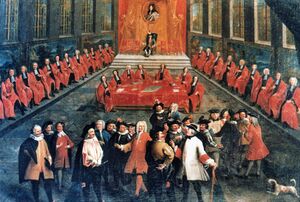
Once the schism raging over the continent eventually reached Aciria, the local governor, Silvain Delacroix drafted up a Declaration of Independence for the Free Republic of Aciria with the assistance of local nobles and clergy by offering them a strenghtened position in the soon to be established People's Senate. The Free Republic of Aciria quickly gained popularity with the commoners due to how promising having a say in the local governance seemed, along with the promise of ending instability in the region brought by the schism. Delacroix became the First Speaker to lead the People's Senate and be a figurehead for the new state, while the clergy, commoners and nobles elected their own representatives. The first three years of rule with Delacroix as head of state went relatively smoothly: relative stability was brought back to the region with the newly formed Grand Army of the Republic, and issues were dealt with in the People's Senate. In 1615, however, Delacroix was granted emergency powers to allow swift decisions on how to stabilize the revolting southwestern region of Chantier; local commoners had revolted against the local nobles due to poor working conditions. The commoners in the senate disagreed with this decision, however, reminding the senate of King Edes and what his rule caused to the region. The nobles disagreed, and after hours of debating, the commoners walked out of the senate; encouraging the commoners to revolt against the "Nouveau Roi, lit. New King". The senate quickly fell apart after this, with the nobles seizing power under First Speaker Laurent. Eventually Laurent's policies angered the clergy, which then caused them to overthrow the nobles, putting a council of clergymen in charge. Such coups happened over and over again, followed by usually revolts of varying sizes.
Age of The Empire
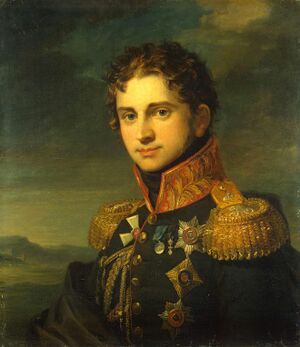
For over 150 years, the region had been in near constant civil war, and leadership changed almost as quickly as the seasons. Due to the instability, many left their homes for nearby lands as refugees to find peace and stability, which obviously wasn't going to happen in their home country. The population dropped due to emigration and deaths from disease, malnourishment, crime and conflict, economic growth was nonexistent and little to no noteworthy works of culture were created in this era, other than the beloved Le Dirigeant, a book satirizing the selfish ruling class who put their own personal gain over the wellness of the nation. In 1783 after returning from a successful campaign on the island of Montvert, First Speaker Dumont granted Commander Dupois the title Marshal of Aciria, and Dupois enjoyed both the admiration of the people, and the loyalty of the military. In the early morning of July 7th, 1783, three months after returning to Trosseurs, he rode to the estate of Dumont with three of his Captains. The guards at the estate knew what was going to happen; they stepped aside and not only let them enter, but joined them. Dupois and his entourage arrested the First Speaker for treason against Aciria and her people, parading him through Trosseurs to the market square, where his crimes were read before the people, and executed on the spot, with no trial. Dupois then rode to the People's Senate, presenting them with the head of the former First Speaker, and declaring himself the First Emperor of Aciria; out of both fear and respect, the senate had no objections for it, and so the Empire of Aciria was born.
Dupois quickly established a more efficient administrative system known as La Chaine, and reduced corruption remarkably with the establishment of Police Administrative Impériale in 1790, which also functioned as an intelligence service, allowing him to arrest and kill any opposition before it became any real risk to his power. For a brief moment Dupois also instituted conscription for any able-bodied man in 1795 to bolster the army's numbers and deter any foreign invasions, but in 1805 conscription was removed due to how insubordinate the army had become. Similarly to the senate, out of both respect and fear, the general populace also allowed Dupois' oppressive regime to stay in power, along with the fact this had been the first time in nearly two centuries a single person had kept power for more than a decade. Dupois knew Aciriens feared instability and return to disorder more than anything, using the stability he brought as a propaganda tool.
Geography
-
The mountains of the southeastern region are famed for their natural beauty. Pictured is Montagne de Larnes.
-
The coast of Acirie is littered with beautiful historical towns such as Chantiers, which gained its historical wealth from shipbuilding.
-
The Acirien heartlands are home to communities built in lush, green valleys.
-
The recently renovated Retraite Impériale on Montvert; the original villa was ordered by the First Emperor in 1798 after falling in love with Montvert during his campaigns.
The geography of Aciria has been both a blessing and a curse for the Aciriens. Most of the Acirien lands are plains and flatlands, which has made Aciria an easy source of invasion from both foreign- and domestic powers. This has directly affected the turbulent history of the nation. The plentiful flatlands alongside the multiple rivers splitting the nation allowed the Aciriens to turn the landscape into vast fields to grow various crops in, and to this day Acirien heartlands are known for their vast and beautiful fields, which still feeds the nation.
In the Griffe peninsula in the southwest of the nation and the southeastern Montagner regions are the only sections of the country with notable elevation from the rest of the country, shown by the Montagners who've managed to stay as a distinct language and ethnic group despite Acirien efforts to assimilate them into the masses. Various mines have been established in the Montagner region over the years, with various minerals, most notably chromium being discovered in the mountains there.
Ecology
Meteorology
Climate and environment
The Acirien nation experiences mainly three kinds of climates; in the southwestern Griffe peninsula a marine climate can be experienced, making the summers warm and humid with cool and damp winters. Rainfall is common during both seasons, and during summer the temperatures can go up to 30°C, and during the winter it can reach as low as 15°C. The mean average temperature of the year is 11°C. Majority of the nation experiences a lessened maritime climate, resulting in hot summers and cold winters. In the mountainous Montagner region of the southeast a subarctic climate is experienced, making the region notably colder than rest of the nation. Summers are short and mild, while the winters are cold and snowfall is common. During summer fog is a common sight in the valleys when moisture coming from the ocean gets trapped between them.
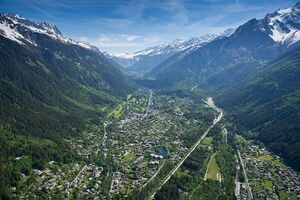
Government & politics
Government

The revamped constitution of 1784 grants the Emperor of Aciria the final say over all matters both foreign and domestic, alongside with the power to overrule any decisions made by the Grand Assembly. The Grand Assembly, on paper, is open to all citizens of Aciria. In reality, the Imperial Senate is practically inaccessible to someone with no nobility, military or aristocratic ties, as the Imperial Senate consists of nobility, high ranking military officers, and aristocrats. The Imperial Senate is responsible for the drafting of new laws and debating the budget on the first month of each year.
The People's Senate is more accessible, but still practically inaccessible to a vast number of the population: it consists of lower nobles, lower ranking military officers and upper middle class to upper class citizens. The People's Senate's duty is to inspect the laws drafted and budgets proposed by the Imperial Senate before it is presented to the Emperor, but the People's Senate has little to no say in the matters, effectively being just another bureaucratic body. Both the Imperial- and the People's Senate has their representatives changed once a decade with an election.
Administrative divisions
The seven administrative regions are Valarién, Aciries Marines, Sainte-Beatrice, Gamme Orientale, Portée Nord, Dutelle and Pâtnoir. The administrative regions are all ruled by an Imperial Governor, who rules til death. The Imperial Governor is appointed by the Emperor himself, appointing only those he trusts the most to these roles, such as close family. The three special administrative regions are Trosseurs, Chantier and Teravien. Trosseurs is directly ruled by the Emperor, as it is where the seat of the Empire and the Imperial Palace is located, but both Chantier and Teravien are ruled by a military junta loyal to the Emperor. Both of the regions earned this after repeated revolts in the regions, and despite for nearly half a century since the last noteworthy instability, the military maintains a strong grip on the region. The Imperial Dominions are bits of land of Aciria which are directly owned by the Emperor, not by the state. Such a dominion is Montvert, which is home to the Imperial Retreat. Despite this, all citizens of Aciria are allowed on Montvert and other Imperial Dominions due to the incredible beauty and historical significance these places may have for the people.
Military
Grand Army of the Empire
Officially formed in 1785 after two years Dupois took the throne, the army has then maintained both a constant presence in domestic affairs since its formation. After the failed Conscription Act of 1795, the army maintained its professional army until 1895 when Dupois' grandson Julien Dupois took the throne, and made a year long conscription mandatory for every able-bodied man. Ever since the act the definition of "able-bodied" has been hotly debated in the Imperial Senate, which has caused ages of either a more relaxed conscription, or a more strict conscription. Originally controversial, over time the conscription has become a rite of passage for young men in Aciria; and a chance for even the most disenfranchised of society to rise up to a higher social class via a military rank.
Police Administrative Impériale
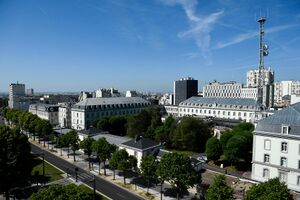
Formed in 1795, the Police Administrative Impériale (PAI) has also had a constant presence in both domestic and foreign matters. PAI has been both praised for securing stability in the nation and rooting out corruption that plagued the nation before the Dupois took over and criticized for infringing on the personal liberties and privacy of innocent civilians, and even accused of making people "go away". Until the 1950s, the PAI had a zero tolerance policy for speaking out against the state or the Emperor, but after reforms in 1957 and 1959, criticism of the government was allowed, and PAI's reputation has been slowly on the rise ever since, even if still somewhat controversial.
Imperial Guard
The Garde Impériale are the elite soldiers of Aciria, who are tasked with defending the Emperor and his possessions. The exact number of Imperial Guard is classified, with most of their numbers suspected to work in the military until a crisis calls for the assembly of the Imperial Guard. They are famously picked from the most promising of conscripts and trained relentlessly, sometimes even causing the deaths of new recruits who simply can't keep up with the rigorous training routine they have to go through. Typically they are seen outside of the Imperial Palace in Trosseurs, on Montvert or accompanying the Emperor's vehicles during his visits to other areas of his realm.
Economy
Infrastructure
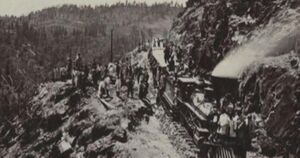
For most of Acirien history, infrastructure inland was practically nonexistent, causing settlements to grow on the coast due to the ease of movement between cities via the sea. It wasn't until Emperor Florien formed the Imperial Railway in 1865 and began building nationwide railway systems, finally connecting the smaller inland settlements to the prosperous coastal cities, allowing both goods and people to move with ease. Imperial Railway is still the only rail company in the nation, but with the invention of cars and the massive highway projects Emperor Julien ordered, the importance of the railways has lessened over time. The local railways and subways in larger cities such as Trosseurs are referred to as Rail Metropolitan, and the railways stretching longer swathes of land are referred to as Rail Rural. The Rail Metropolitan in Trosseurs is highly affordable and the main method of transport in the capital, transporting 120 000 passengers daily.
Demographics
By far the majority of nation identifies as Acirien, an umbrella term consisting of multiple former tribes that inhabited the modern day area of Aciria. The only notable minority in the nation is known as the Montagner, who are one of the Acirien tribes that refused assimilation under the umbrella term due to their distinct cultural and linguistic development caused by their remote location in the mountainous regions of the country, having limited contact with the other Aciriens until the 19th century. Other ethnic groups in the country are made up of whatever expats and other foreigners that have settled in the country over the years, which aren't accurately accounted for in the census.
Languages
The biggest and the only official language in the nation is Acirien, spoken by both the majority Acirien ethnic group and the minority Montagner ethnic group, the latter speaking it with its own unique, distinctive accent from the rest of the nation. In recent years there have been demands by the Montagners for the government to acknowledge Montagner as its own, distinct language and grant it an official status, but little development in pushing these demands in the government has been made.
The sanctity of the Acirien language is dictated by the Académie Acirien in Trosseurs, which keeps foreign influence in the language in check.
Education
Higher education is free in Aciria, paid for by the government. Due to this, how many students are taken in annually is limited, creating a lucrative industry for students who want to prepare for the exams. Higher education is available to all, but due to the connections nobles and aristocrats have, they often sponsor the schools to encourage them to pick their children, if they have reason to suspect their child's entrance exams would go less-than-ideally.
The most notable centers of higher education are the Imperial University of Trosseurs established in 1576. Since the 90s it has spent notable amounts of money on its computer science labs, causing notable developments in cybersecurity and robotics in the nation. Other notable centers of higher education are the Imperial Academy of Trosseurs established in 1783, a military academy where most of the commanding officers of the Acirien military come from, the Naval Academy of Soleir established in 1788, and the University of Marothien, established in 1872. The aforementioned universities are the most prestigious, most applied to universities in the country, almost guaranteeing a successful career in whatever the graduates decide to go for in their lives.
Health
Universal healthcare is present in Aciria, with a small private sector allowed for things such as plastic surgery and dentalcare. Universal healthcare often has long waiting lines for non lifethreatening problems, causing the waiting rooms to be full all day round in the various hospitals and clinics around the country. The state has the right to move medical professionals from facility to facility, region to region if one facility or region is lacking in professionals, and even is known for taking people out the private sector to work in the public sector during health crisis'.
Social order
Despite the vast wealth of the nation, majority of the population belongs to either lower- or lower middle class, the wealth often being funneled to the ultra-rich who are infamous for their lavish, decadent lifestyles. Despite on paper, the constitution guarantees equal rights for Aciriens, the lower classes are practically unable to attend higher education or enter politics. Success in the military is the only real way for lower classes to rise in the social structure, for both lower and higher ranked military officers can enjoy great benefits.
Due to the stark difference in the lifestyles of the ultra rich and the poor, both parties share a mutual disdain for each other. A middle class exists in a limbo of uncertainty, worrying for their fall into the lower classes, and dreaming of rising in the social structure.



